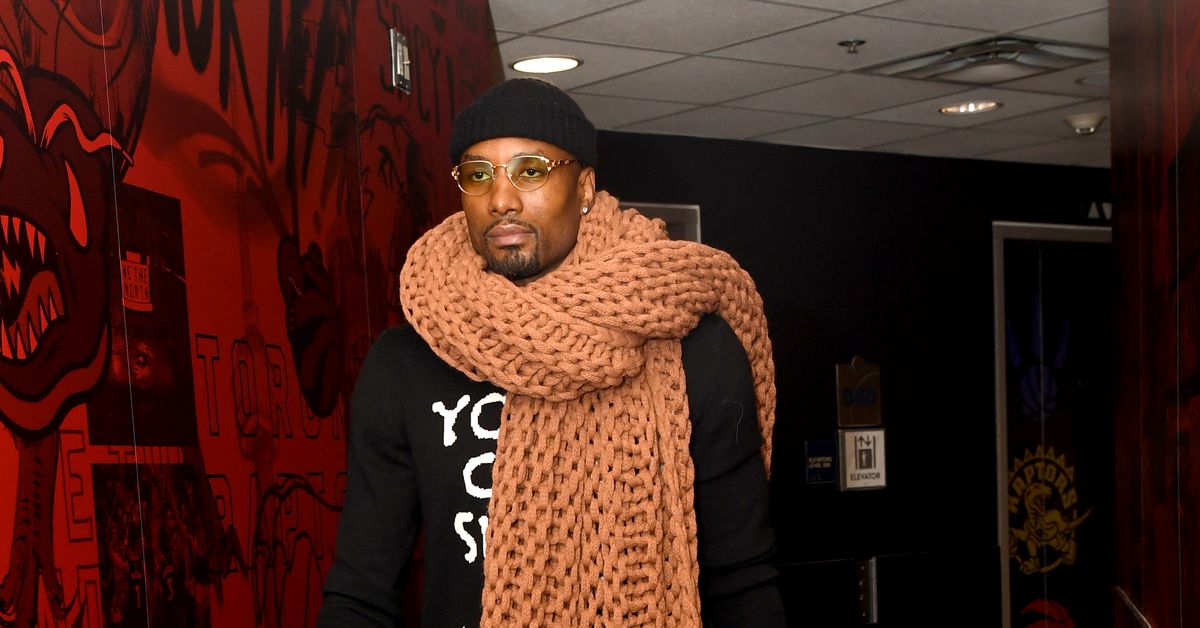Sports
Serge Ibaka was an NBA pioneer, on and off the court – SB Nation

Filed under:
Will Serge Ibaka be remembered for basketball, scarves or getting Kawhi Leonard to eat beef penis pizza? Only time will tell.
Napoleon Bonaparte carved Europe into one of the largest empires the world has ever seen. He ended the terror of the French Revolution. He implemented a code of law still used in parts of the world, such as the Canadian province of Quebec. Any of those achievements would be good bets for what he’s come to represent to the public today.
But all would be wrong. In everyday parlance, Napoleon is best known for being short and kind of a dick about it. See: Napoleon Complex. All this to say, it’s not always certain what we come to represent over the fullness of time.
With news that Serge Ibaka signed a one-year deal to play with Bayern Munchen, it’s unlikely that the champion will ever play in the NBA again. Hampered by injuries for a few seasons, the 34-year-old hasn’t been a prominent rotation player in the NBA for just as long.
But for many years, the spine of the ever-shifting NBA ran through Ibaka-like fault lines, both on and off the court. He may have had larger-than-life (and MVP-winning) teammates in Russell Westbrook, James Harden, and Kevin Durant in his early days in Oklahoma City, but arguably none of them defined life in the NBA — and changed in accordance with it — like Ibaka.
When Serge Ibaka first entered the NBA in 2009, he was a high-flying big who shot no three-pointers and blocked every shot that entered his orbit. In some ways, he represented a last gasp of a dying era ruled by such bigs. The league itself averaged only 18 3-point attempts per game.
It’s hard to overstate the extent of Ibaka’s shot-blocking prowess early in his career. Since his rookie year in 2009-10, Ibaka registered two of the four seasons with the highest blocks per game. His five seasons averaging 2.4 blocks or more per game led the league in such seasons over that time period — and he did it all in just the first six years of his career.
But Ibaka evolved quickly. He blocked nearly 10 times more shots than triples he attempted in his first five seasons, but for the remainder of his career he shot twice as many triples as he recorded swats. He dipped his toe into shooting threes in his fourth season, joining a vanguard of shooting bigs led by Dirk Nowitzki. By 2014-15, he was launching more than three such shots per game, among the 10 league leaders in frequency at his height or taller. Then in 2020 his career-defining moment came on a stick-the-landing 3-pointer during a championship run.
(His triple from that corner, of course, was overshadowed by a teammate’s later in the game.)
The growth in Ibaka’s game mirrored trends across the league. He entered the NBA as a non-shooting power forward and left it as a shooting center. Across the league in 2014-15, centers attempted 1,640 triples in the regular season, according to Second Spectrum. By 2018-19, that number had almost tripled to 4,462. Ibaka himself posted up much less and became more of a pick-and-roll big and a floor spacer. He blocked fewer shots and rebounded more misses.
But Ibaka’s significance within the NBA is arguably more profound off the court than on it. He was a locker-room leader and culture-setter. For years during Toronto’s pre-game introductions, it would be Ibaka waiting on the court to dap every starter after they were announced. His significance also extended far beyond the boundaries of his own teams.
When he was drafted in 2008 (he spent a year abroad after being drafted), NBA fashion existed in a different world from today. Pants were long and baggy, if not quite to the extent they were a decade earlier, and suits on draft night were generally reserved for muted tones like gray, black, and beige.
Ibaka helped usher in a new era. Fashion is one of his passions. He has never been associated with terms like “muted” or “reserved,” and you’re more likely to find Ibaka in orange or yellow suits than black or gray. As he has been wont to say over and over, Ibaka doesn’t do fashion; he does art. And since Ibaka’s popularization of wearing perfectly fitted and custom-designed statement pieces, players across the league have expanded their outfits into new territory. Ibaka, as always, has been at the forefront. His dedication to fashion was also hilarious, such as when he turned teammate O.G. Anunoby onto scarves.
Ibaka’s artistry spreads beyond fashion, as he dabbled as a professional cook in his series How Hungry Are You. His crowning achievement there was arguably feeding beef penis pizza to Kawhi Leonard while conducting a fluid, revealing interview that would make ESPN heavies jealous.
Many NBA players see media duties as an annoying and vacuous part of the job, like a parent views changing diapers. It has to be done, so plug your nose and sing their favorite song. Ibaka seemed like one such player when he first arrived in Toronto in 2017. But when he discovered the wage disparity between reporters and players, he immediately transformed into an open and eloquent speaker in scrums. He became one of the best quotes on the team.
For all his empathy and kindness towards media members, the reverse hasn’t always been true. High-profile media members helped spread the NBA’s version of birtherism about Ibaka, questioning the validity of his birth certificate because he hailed from the Republic of the Congo in Central Africa. Ibaka eventually put out a statement ridiculing the rumors, saying he was “not born in the jungle.” But since Ibaka’s draft, many more players have joined the league from Africa, including stars like Joel Embiid and Pascal Siakam. Ibaka has long seen himself as an ambassador for African players; he engraved his championship ring with a silhouette of the continent.
Ibaka certainly wasn’t the first African NBA player, but he helped crack open the gates for those who have followed. And there have been few, if any, high-profile xenophobic age criticisms attached to them.
It’s impossible to know how Ibaka will be remembered years from now, what ghosts his name will conjure in the barbershop. We can’t predict what we’ll come to represent. For Ibaka, it could be scarves or beef penis, blocked shots or three-pointers. It could be a championship in Toronto or a lack of one in Oklahoma City. But people will be talking about him. Ibaka has been a core definer of the NBA’s zeitgeist ever since joining the league, and he’s done it in uncountable ways. The NBA will miss him, but Ibaka will continue pushing the frontier of player life in EuroLeague.
Those things are certain. The only uncertainty is how Ibaka will reinvent himself next.
GAMBLING PROBLEM? CALL 1-800-GAMBLER (1-800-426-2537) (CO/IL/IN/KS/LA/MD/MI/NJ/OH/PA/TN/VA/WV/WY), (800) 327-5050 or visit gamblinghelplinema.org (MA). Call 877-8-HOPENY/text HOPENY (467369) (NY).
Please Gamble Responsibly. Call 1-800-NEXT STEP (AZ), 1-800-522-4700 (NH), 888-789-7777/visit ccpg.org (CT), 1-800-BETS OFF (IA), or visit OPGR.org (OR) or www.1800gambler.net (WV).
21+ (18+ NH/WY). Physically present in AZ/CO/CT/IL/IN/IA/KS/LA(select parishes)/MA/MD/MI/NH/NJ/NY/OH/OR/PA/TN/VA/WV/WY only. Void in ONT. Eligibility restrictions apply. See terms at draftkings.com/sportsbook. On behalf of Boot Hill Casino & Resort (KS). Licensee partner Golden Nugget Lake Charles (LA).









